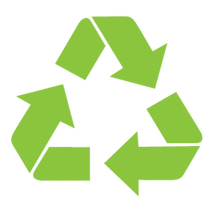 It's imperative that we recycle to reduce our wastefulness, but it is as equally important that we are recycling the correct items and in the proper way. A large percentage of people who frequently recycle throw mostly anything in the bin without giving it a second thought as to if it is truly recyclable or not. It may seem like a good idea to throw in those items that you are unsure of “just in case”. However, there is a secret that the recycling plants don't tell you. Only a small percent of what we ship off to be recycled ends up there. Alarmingly there has been over an 80% rise in the number of rejected recycling. So why is this and where does rejected material go? The “where” is easy. If materials can’t be recycled, they go to the landfill. The “why” is a more nuanced question to answer. However, in attempts to provide an answer we must first look at the process of recycling. In simplistic terms, recycling works in the following way: items are placed in a bin for recycling, those items are collected and sent to a recycling plant to be sorted, and lastly those sorted materials are sent off to a processor to be repurposed. Many things can go wrong in each step to throw off the recycling process. Typically, the mistakes happen in the first step, with us. We tend to throw away things that can’t be recycled or are “contaminated”. If there is an influx of materials that are not recyclable, recycling plants tend to send those shipments to the landfill even if there are recyclables in the mix. Additionally, if recyclables are contained within a plastic bag, the sorters will not open the bag to go through it. They will simply discard it. The best thing one can do is keep their recyclables loose in a bin. Another problem is the contamination of recyclables. This includes items that can’t be recycled, items that contain food residue, or broken glass. Once a recyclable has been contaminated, its overall quality is diminished. Why is the monetary value of recyclables important? The reason is because the recycling plant is not what is transforming the “trash” into products. This is the processor. If the processor sees little to no monetary value in the trash, then they won't buy it. China was the largest buyer of recyclables from the United States. Recently, China has put a ban on the export of recyclables into the country from the US, UK, and Australia. One of the main reasons for this decision is because too many of the recyclables had been contaminated and therefore decreased the return on investment for China. China requires a low contamination rate of 0.5 percent, however US recyclables reach upwards of a 25 percent contamination rate! After China stopped accepting our recyclables, the US could not keep up with the influx of recyclables and were unable to sell them. Faced with a product that isn’t selling, the recyclables are being trashed as many cities and municipalities are simply no longer recycling! So how can we prevent recyclables from ending up in the landfill??? Here are 7 recycling tips:
-Written by WCSWCD Intern, Josie Mitchell For more information about recycling around Warren County, visit: www.co.warren.oh.us/SolidWaste/ For a list of approved recyclables from Rumpke, visit: https://www.rumpke.com/for-your-home/recycling/acceptable-items Rumpke has also made a list of tips for consumers so that we can all work together to control our waste and reuse unwanted items:
19 Comments
10/26/2021 01:25:45 am
That's true that we should avoid or lessen the usage of it that if only plastic producers will do something about it.
Reply
3/23/2022 10:55:37 am
I love that you talked about recycling and how to prevent your recycled items from ending in a landfill! Last week, my girlfriend said she wants to help her community by starting a recycling program. I believe your article will provide key recycling information to my girlfriend's project, so I'll share it now! Thank you so much for the advice on cleaning recyclables first!
Reply
3/28/2022 10:52:25 pm
Diaper Recycling Technology is a technology company solely focused on advanced diaper recycling solutions.
Reply
4/20/2022 01:35:16 am
It made sense when you mentioned glass is recyclable, but it is different when it comes to broken glass. My friend wants to ensure that they are practicing recycling in their processes. I think they should partner with a recycling company that also offers recycling transfer station.
Reply
5/4/2022 07:58:37 pm
I'm glad that you talked that it is necessary to have second thinking if you are putting waste in the bin if it could be recycled. One of my parent's friends told us a couple of days ago that they are looking for a recycling company that they could go to converting the plastic wastes in their workplace to reduce liability and risk. Thanks for this enlightening article, and I'll be sure to tell them that consulting a reputable plastic recycling company can help them with the correct process.
Reply
10/5/2022 07:10:59 pm
My dad has a lot of scrap metal that he'd like to recycle this weekend. I'm glad you mentioned the importance of making sure your recyclables are clean to prevent them from being rejected. I'll share this tip with him and help him find a recycling service that accepts scrap metal for a good price.
Reply
10/19/2022 10:19:01 am
I have a bunch of stuff that I need to get recycled, but I'm not sure how to go about it. It makes sense that working with a professional would be important! I'll be sure to get a recycling specialist to help me out with this to ensure that it's all put together properly.
Reply
I never took into account the fact that sorters from recycling companies will not open items inside plastic bags and just throw them into landfills instead. With that in mind, people and companies should make sure that they place items in a commercial recycling box without plastic bags covering them to ensure that they can be reused properly. Doing so can prevent lots of items going into the landfills and affecting our environment and planet.
Reply
1/5/2023 05:03:09 am
I never took into account the fact that a recyclable material can be contaminated which can diminish its value. With that in mind, we have to make sure that we segregate items to ensure that they can be reused and prevent them from going into landfills. One of the things we wanted to give importance to is metal recycling because we have lots of parts from our old car that we might be able to sell.
Reply
1/10/2023 04:14:17 pm
It was informative when you mentioned that most plastics are recyclable. I would imagine that there are a lot of companies that utilize different grades of plastic in order to run their businesses. I would think that it would be a good idea for these companies to work with a plastic processing service so that the material can be handled properly when it isn't being used anymore.
Reply
2/27/2023 10:06:29 pm
I appreciate you pointing out that a recyclable loses some of its overall quality once it has been polluted. My sister needs to get rid of some metal furniture. I'll advise her to use a scrap metal recycling business and to check the product's quality.
Reply
3/2/2023 07:12:14 pm
I appreciate that you explained that you should consider implementing segregation to ensure that correct materials are being recycled. My uncle told me yesterday that he planned to dispose of his scrap metals but not the waste and save the environment. Thanks to this informative article, I'll tell him he can consult a well-known scrap metal recycling service as they can help with proper scrap management.
Reply
3/20/2023 01:19:54 am
The greatest explanation of why we need to recycle is provided in this article. I really enjoyed it, and I appreciate you sharing it with us. You presented this content in a really effective way, and your visualization is excellent. Visit Scrapmart.co.nz if you can for more information or advice on the subject.
Reply
4/13/2023 11:29:34 pm
I appreciate you noting that when goods are put in a recycling container, they are collected and transferred to a recycling facility to be processed, and then those sorted materials are delivered to a processor to be used for something else. With her factory, my sister has a lot of scrap metal. I'll advise her to pick up the recycled scrap metal.
Reply
This blog highlights the critical importance of recycling correctly and offers valuable insights into the recycling process. It's disheartening to learn about the high rate of rejected recycling, especially when much of it can be attributed to our own actions. The tips provided here are practical and necessary for improving the recycling system and reducing contamination. We all play a role in ensuring that recyclables reach the right destination and contribute to a more sustainable future. Thank you for shedding light on this issue and offering solutions to make recycling more effective.
Reply
7/10/2024 03:59:06 am
Evironmental Health :- In today’s era, healthy lifestyle and environment are questionable! You can’t deny it for any reason! Believe it or not, we have started polluting the earth slowly. Apart from that, we don’t make any efforts to take care it. Generally, we criticize others, but do not realize about our own laziness. Thus, find out what we are doing for the environmental health and safety!
Reply
Leave a Reply. |
Details
Warren County SWCD Staff BlogA blog to keep you informed on all the latest news at Warren County SWCD and in the conservation world. Archives
May 2024
Categories
All
|
|
|
Contact:PHONE: (513) 695 - 1337
EMAIL: [email protected] HOURS: Monday - Friday 7:30am - 4:00pm (except holidays) Connect:Warren County Soil & Water Conservation District Copyright © 2016
Warren SWCD Privacy Notice. Emails are serviced by Constant Contact. Constant Contact's Privacy Notice. |


